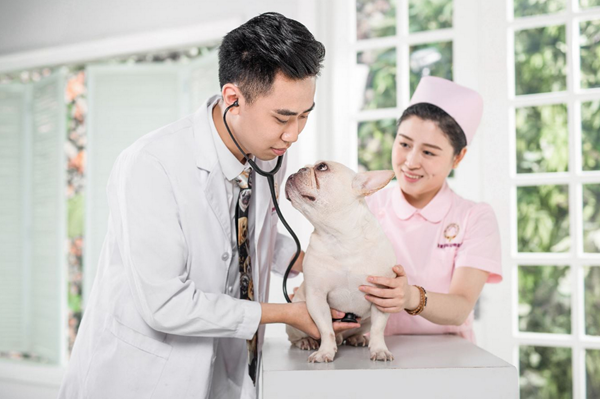
A veterinarian conducts a physical examination of a dog. [Photo courtesy of Loving Pet International Animal Medical Center]
The close relationship between the novel coronavirus (2019-nCoV) outbreak and wildlife had sparked fears over whether pets, such as dogs and cats, can spread the disease. For tens of millions of pet owners in China, how to keep both themselves and their furry friends healthy has become an essential concern.
The World Health Organization (WHO) said in its public advice issued on Jan. 29, that "at present, there is no evidence that companion animals/pets such as dogs or cats can be infected with the new coronavirus."
Jin Yipeng, deputy dean of College of Veterinary Medicine at China Agricultural University, explained that there are hundreds of virus species under the four main sub-groupings of coronaviruses, and each species targets different kinds of animals.
"2019-nCoV significantly differs from those common coronaviruses that can infect dogs and cats. The current findings suggest that humans face no risk of catching coronaviruses in dogs and cats, and 2019-nCoV, in particular, cannot infect pets," Jin said.
As to some experts' suggestion that pets need to be isolated after contact with an infected person, Jin said it doesn't mean pets will contract the new coronavirus and transmit it to other people as intermediate hosts.
"Temporary isolation is needed because pets, like their food, clothes and other life necessities, may become 'movers' of the virus. But after thorough cleaning and disinfection, it is safe to continue raising the pets as normal," he added.
Jin also warned pet owners not to discard their animals for fear of contracting the novel coronavirus. "Discarding pets will not help curb the spread of the new coronavirus, but rather invite other public health problems since abandoned animals could expose humans to other virus and bacteria."
Gong Haohan, chief veterinarian of Loving Pet International Animal Medical Center said he felt deeply distressed when he read the reports of people discarding their pets due to panic.

A dog lies on the floor. [Photo courtesy of Loving Pet International Animal Medical Center]
With more than 10 years of experience in clinical veterinary medicine, Gong said the best way to protect pets during the outbreak is to reduce their outdoor activities as much as possible, and clean them with disinfectant after returning from visits to public areas.
Pet owners also should pay attention to the physical and mental conditions of their animals, and take them to veterinary institutions in a timely manner if they have symptoms such as depression, fever, cough and dyspnea, Gong advised.
According to statistics released by CBNData, in 2018, the number of Chinese households with pets hit almost 100 million and the pet industry was worth over $25 billion. Meanwhile, great changes have taken place in Chinese people's attitude towards animals.
"In the beginning, many people used to regard pets as useful in safeguarding their homes. But nowadays, pets are more likely to become an important family member. Pet owners are more willing to seek and accept professional advice," Gong said.




